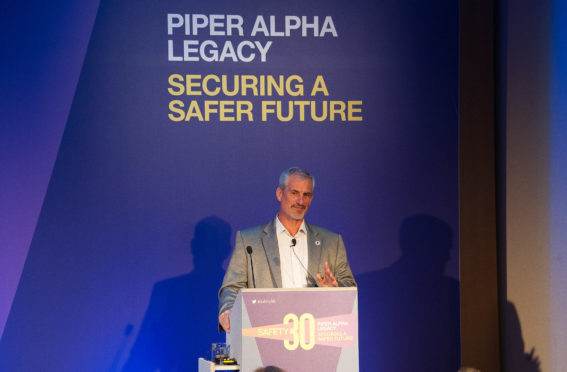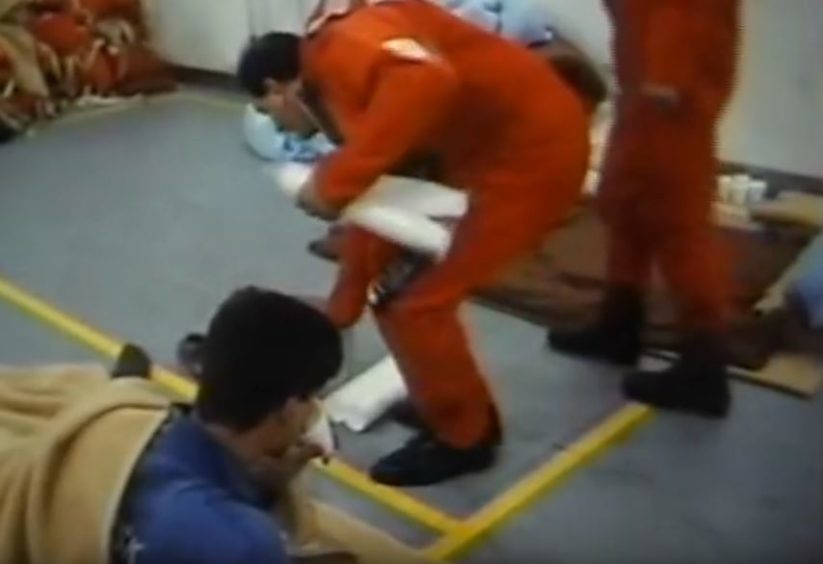Steve Rae escaped with his life from the burning Piper Alpha rig because he ignored the rules – and has spent the last 30 years improving safety systems as a result.

In a long and successful career devoted to improving offshore safety, Steve Rae has focused on honing one essential skill for any platform worker: “situational awareness”.
The industry veteran believes a one-size-fits-all approach to training for emergencies leaves too many gaps.
And that belief is rooted in the most direct possible of experiences: he escaped with his life from Piper Alpha only because he decided to ignore the rules.
“I somehow knew the rules weren’t going to save me that night,” he told us, as he reflected on the disaster.
“I came to the realisation fairly quickly after the first explosion, as I was being led into the accommodation through the external door with I think seven or eight others in a human chain.
“I knew, just by looking into the corridor we were entering that it wasn’t the right place to go for me. It was filling up with smoke, the lighting was poor and my situational awareness (instinct) told me that simply wasn’t the place to go.”
Rae worked for Bawden Drilling at the time, was 26 years and 14 days old on that fateful night and determined to go on living.
He was anxious but recalls that he wasn’t yet terrified. He had come from the drill floor which at the time was still relatively clear of smoke and flame.
He said: “In my mind I felt there was a better route to take rather than going into the accommodation (designated safe refuge). I was fairly controlled; I certainly wasn’t
terrified.”
Now operations manager of Well-Safe Solutions in Aberdeen, Mr Rae is one of the few who stayed in the industry despite witnessing the horror at close quarters.
He has a clear sense of the failings that resulted in the huge death toll and has a mission to make sure the legacy “continues to be re-visited, referenced and shared”.
“I’ve been in very responsible roles leading people and been accountable for significant businesses where I’ve been able to use my stature in the hierarchy,” he said.
Giving back
“This is where I’ve really been able to use my Piper experience in a positive manner attempting to influence the companies and departments that I’ve been responsible for which did not go unnoticed at industry level.
“That for me has been the best thing I could ever have given back to this industry.
“Rather than recounting the trauma and experience of the night, which is a story that needs to be told, I genuinely believe that if I can contribute messages that can influence the industry, including new entrants, then that is giving back.”
The lack of any formal guidance for those arriving on the doomed rig remains clear in his mind today.
He said: “I had arrived for my third tour although my crew had been there many months before me. We never received a safety induction when we arrived on board. In my case this time it was off the helicopter and straight to bed because we were on nightshift.
“We were never offered a safety induction and never asked for one.”
“If I think about all the installations I’d been on previously, you arrived, in some cases you hadn’t even take your (survival) suit off before being given an immediate update of what was going on aboard the platform.
“And if you hadn’t been on before you would certainly be taken to your (designated) lifeboat, muster station and so-on. In other words you were inducted every time you arrived on board.
“That was not the case on Piper. My understanding is that people were rarely inducted. And I certainly wasn’t inducted that day.
“Nor were we informed, from a platform perspective, what other activities were taking place.
“Those things that I talk about now are all aspects of why I believe I made the decision not to go inside. For me I was being asked to enter an area that in my mind was far more dangerous than the one I opted for.”
Life-saving decision
In short, Rae and others had opted to leap into the sea; in his case from a height of 68ft to escape the blazing installation – to the relative safety of the Tharos.
The experience has directly shaped his approach.
“For me, there’s a lot of value in training getting lost because time and effort is being spent on elements that are not necessarily appropriate to building your particular level of emergency preparedness competence,” he said.
“I would question the value returned to a worker, or his employing company, from having to do this training curriculum five or six times in his working life.
“What I’m not at all saying is don’t do training. What I’m saying is training should be tailored to the individual including ensuring that any tendency towards memory fade over time is effectively countered.
‘You have to know where you are’
“That’s something that I don’t think the industry does particularly well from an assessment point of view. We don’t do very thorough assessments post-training or in the workplace.”
“I talk about situational awareness,” says Rae.
“That for me is paramount on an oil and gas installation. You have to know where you are, where the risks are and where the exit ways are.
“The industry is entering a phase where its offshore workforce is more transient and nomadic than ever before. You can have individuals who visit four or five different platforms/rigs in four or five months.
“Each of those may be similar in facility provision but dissimilar in how you get to/from those facilities in an emergency. For me, I think that’s where situational awareness becomes an essential element required to support a larger transient workforce who travel to different platforms on a frequent basis.”
Mr Rae, one of the keynote speakers at the Piper 30 conference in Aberdeen, has concerns about the safety implications of oil and gas emerging from the recent downturn.
With many having left the industry for good during the lean years, he fears an eagerness to re-hire now may result in unacceptable levels of risk on the people front.
“I’m concerned about the ‘Big Crew Change’ issue. Since 2010, the UK industry had been discussing and making plans for this eventuality as the workforce aged, seeking ways to transfer and retain knowledge as people left the industry.
“I believe that the most recent oil price downturn accelerated the first half of this big crew change causing it to arrive with little, if any, prior notice forcing industry to react by shedding tens of thousands of jobs.
“Now the second part of the change is upon us; four years after oil prices fell sharply. Only now is the price recovering and with it returns the inevitable thirst for additional people.
“Because of the now advanced maturity of the North Sea, the impacts of the 2014 oil price drop and the time taken for recovery to begin, many of the people who were still around after previous downturns to mentor and coach new blood, have gone, making it much harder to transfer the unwritten experience.
“Of course the industry will see some of its seasoned workers return; I also think you’ll see some people who may have been in offshore, hands-on tools, positions before the downturn take up some onshore training roles.
“However, while the coaching and training staff may have changed the new recruits and those who are returning to work, can expect to receive the same safety training curriculum and refresher schedules.”
He believes the introduction of regulations around safety reps in the wake of the disaster was “one of the most fundamental strengthenings of the approach to health & safety offshore”.
But he also believes a change in culture – and law – that has made clear corporations are more likely to be held responsible for their actions has made a significant difference.
Recalling a conversation with a US colleague, he says: “I recall him telling me when he transferred to the UK for the first time to a very senior position, he was made aware that he could be held accountable and potentially go to prison for things that he may not be responsible for but, as the head of the company, would be.
“This was not the case in his home country.
“He changed his outlook completely from his American cultural approach to leadership, as it became clear to him that he really could be held accountable should the company suffer an incident in the North Sea.
“Probably already wired that way, he became a better person for making the change, he studied the Cullen enquiry which led him to understand why that change had happened and then he understood the impact that he could have on implementing health and safety from the boardroom.
“Now he’s back home, one of his criticisms of the American system is that the understanding which prevails in the North Sea does not exist in the US. They’re driven by different motivators over there.
‘We have come a long way’
“Overall, we have come a long way in terms of learning from events, though the industry is still not great at sharing. We collect a lot of data as companies but this is not openly shared for the betterment of the industry.
“That’s both on a regional basis and on an international basis. The companies need to be far more collaborative outside their own walls; that would be to the benefit of all.”
Three decades on, how often does Mr Rae reflect on the happenstance that somehow enabled him to still be working in the offshore industry today?
“Every day in a different manner,” comes the response.
“I’ve never suffered flashbacks to the disaster. But at some point in every day there is a time when I remind myself that it could have all been so different.
“I’m blessed to be here.”
To follow more of our special Piper Alpha 30th anniversary coverage, click here

